Petrol subsidy cuts for top 15% of income earners, increased minimum wage as Malaysia unveils record US$97.8 billion Budget
According to the finance ministry’s outlook for next year, the Malaysian government revenue is projected to grow by 5.5 per cent to RM339.7 billion, spurred by higher direct and indirect tax collections.
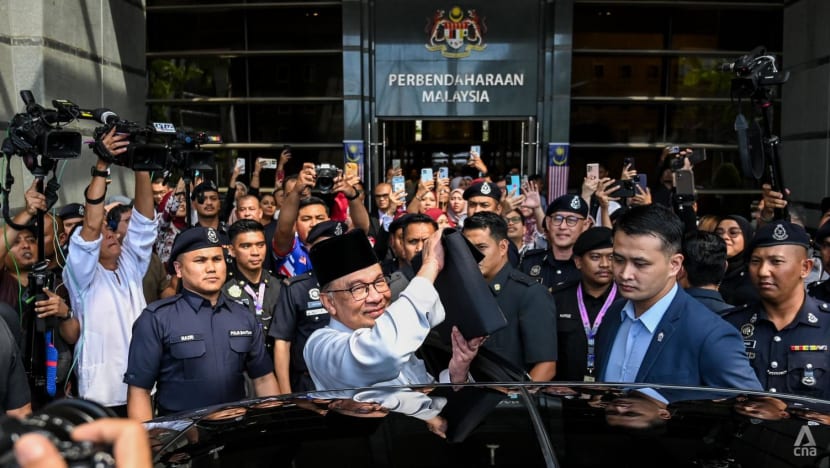
Malaysia Prime Minister Anwar Ibrahim, who is also the country's Finance Minister, making his way to his motorcade heading to the Parliament to table Budget 2025 on Oct 18, 2024. (Photo: CNA/Fadza Ishak)

This audio is generated by an AI tool.
KUALA LUMPUR: Top-earning Malaysians can expect to be hit with higher expenses next year - among them increased costs for RON95 petrol as well as for education and healthcare - as the government seeks to roll back subsidies for this segment of society in a bid to free up monies for other purposes.
The announcement came as Prime Minister Anwar Ibrahim unveiled a larger RM421 billion (US$97.8 billion) budget for 2025 on Friday (Oct 18).
Consumer prices are expected to creep up next year as the Malaysian government seeks to trim its hefty subsidy and social assistance bill by removing blanket RON95 petrol subsidies, an unpopular move that it initially held off but ultimately deemed necessary to ease pressure on its coffers amid plans to spend more.
The larger budget will fund higher civil servant salaries taking effect in December.
Mr Anwar on Friday also committed to raising the country's minimum wage to RM1,700, up from the current RM1,500, in February next year.
Government revenue is projected to grow by 5.5 per cent to RM339.7 billion, driven by higher direct and indirect tax collections.
The country is targeting a further fiscal deficit reduction to 3.8 per cent of gross domestic product (GDP) next year, down from the current target of 4.3 per cent this year.
Mr Anwar also said the government will expand the scope of its Sales and Service Tax (SST) to include commercial services, and introduce a 2 per cent tax on dividend income.
The RM421 billion budget for 2025 is an increase from the expansionary 2024 budget of RM393.8 billion last year, which was the largest-ever recorded then. That figure has since been revised to RM407.5 billion, according to the Finance Ministry.
Development expenditure accounts for RM86 billion of the 2025 spending while the remaining RM335 billion is for the government’s operating expenditure.
Analysts told CNA the moves to increase revenue and cut spending will help Malaysia achieve its new fiscal deficit target, but should this not come to pass, the government should be open to implement further measures.
These include bringing back the Goods and Services Tax (GST) and fully removing petrol subsidies, they said, noting that the ultra-rich do not form the bulk of consumers of public healthcare and education, and thus might not yield the government substantial savings through subsidy rationalisation in these areas.
PETROL SUBSIDIES
Mr Anwar, who is also Finance Minister, invoked Confucius when talking about Malaysia's subsidy bill, quoting the Chinese philosopher about the perils of not correcting a mistake.
"The principle of subsidies, like welfare benefits, is that it should not benefit the ultra-rich," he said, noting that the country has a longstanding policy of blanket subsidies for things like petrol, electricity, water, education, healthcare, and food items like chicken.
"Surely, this approach is not reasonable as the the country is burdened by debt and low revenue."
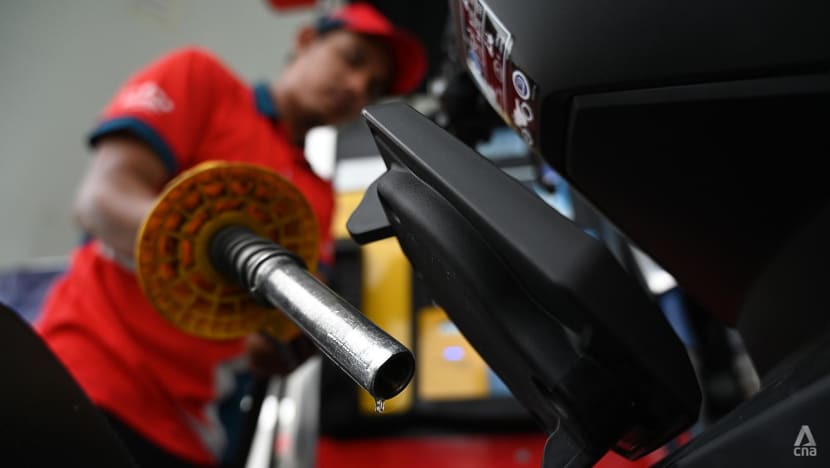
Mr Anwar said the government currently spends RM20 billion a year on blanket subsidies for RON95 petrol, which unfairly benefit the top 15 per cent of earners - as well as foreigners - in Malaysia.
This segment accounts for 40 per cent, or RM8 billion, of the petrol subsidies given out, Mr Anwar said, noting that this amount would be better spent on education, healthcare and transportation needs.
"The government intends to rationalise subsidies for RON95 petrol in the middle of 2025," said Mr Anwar.
"To avoid confusion, I want to stress that the government will continue to subsidise petrol for the other 85 per cent of the population. This means the government will continue to spend RM12 billion on petrol subsidies for the needs of the 85 per cent."
He did not offer details on how these targeted petrol subsidies will be effected at the pump.
Petrol Dealers Association of Malaysia secretary-general Bashir Abdul Razak told CNA that once the move kicks in, he expects petrol stations to start charging unsubsidised prices for RON95, while the government distributes subsidies to the bank accounts of those eligible.
Meanwhile, subsidies for boarding schools will also be retargeted to remove financial assistance for the country’s top 15 per cent of income earners, while similar reforms will be made to the country’s public healthcare system, Mr Anwar added.
These moves will contribute to a 14.4 per cent decrease in spending on subsidies and social assistance, projected to be RM52.6 billion in 2025, the Finance Ministry said.
“This decline is due to the implementation of the electricity subsidy rationalisation and targeted fuel subsidy programmes,” it said.
Almost half, or 45.5 per cent, of the RM52.6 billion will be allocated to various social assistance and incentive programmes aimed at supporting vulnerable groups, the ministry added.
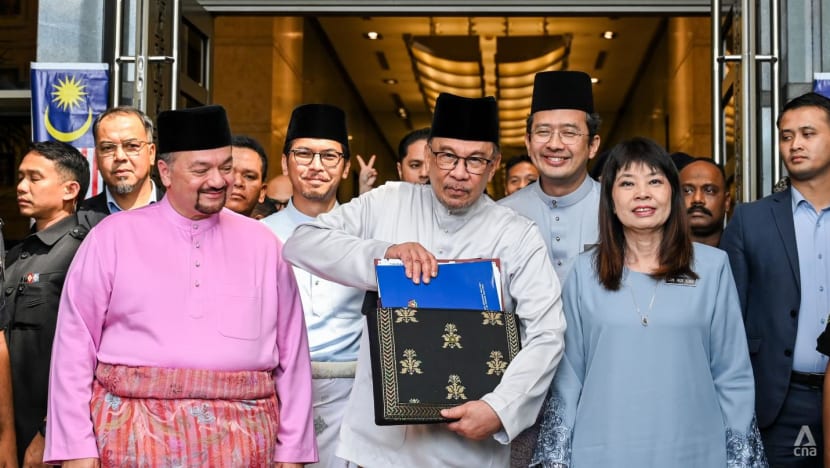
While the government acknowledged the shaving of subsidies could cause prices to rise, it noted that inflation remained moderate after diesel subsidies were rationalised in June, thanks to targeted cash assistance and subsidies for selected business sectors.
Headline inflation is expected to remain “manageable” at between 2 per cent and 3.5 per cent next year, the Finance Ministry said in its 2025 economic outlook released on Friday, up from between the 1.5 per cent to 2.5 per cent projected for 2024.
It was previously reported that blanket subsidies for RON95 petrol had made up most of the RM81 billion that Malaysia spent on subsidies in 2023 and are said to unfairly benefit high-income households.
The projected RM421 billion expenditure - or 20.2 per cent of Malaysia’s GDP - for 2025 is an increase from the revised expenditure of RM407.5 billion in 2024.
This is primarily due to higher salaries and retirement charges from implementing the new pay structure for civil servants across all grades, and higher debt service charges, the Finance Ministry said.
In the first phase starting Dec 1, lower- and middle-grade employees will receive an 8 per cent salary increase, while upper management will see a 4 per cent raise.
The next phase, starting in January 2026, will further boost salaries by 7 per cent for lower- and middle-grade employees and 3 per cent for upper management.MINIMUM WAGE
Meanwhile, the move to raise Malaysia's minimum wage to RM1,700 - up from the current RM1,500 - will help its people get more "meaningful" salaries that contribute to a more comfortable life, Mr Anwar said.
For employers with fewer than five workers, the government will delay enforcement of the minimum wage by six months to August next year, he said.
In addition, the Human Resources Ministry will set starting salary guidelines for every sector in the workforce, the premier said. This comes at a time when more than half of fresh graduates in Malaysia have been drawing a starting monthly salary of less than RM2,000 over the past decade.
For instance, the government will recommend that mechanical engineers earn a starting salary of at least RM3,380, while creative content creators should get at least RM2,985, Mr Anwar said.
Malaysia’s “robust” economic growth, expected to be between 4.5 per cent and 5.5 per cent in 2025, is likely to generate more income opportunities for the workforce, the Finance Ministry said in its economic outlook for 2025.
Ongoing efforts to restructure the economy by promoting advanced technologies, improving productivity through retraining and upskilling, and reducing reliance on foreign labour can lead to additional income growth, it said.
“The implementation of the new minimum wage rate and adjustments to civil servants’ salaries will further contribute to the rise in workers’ income,” it added.
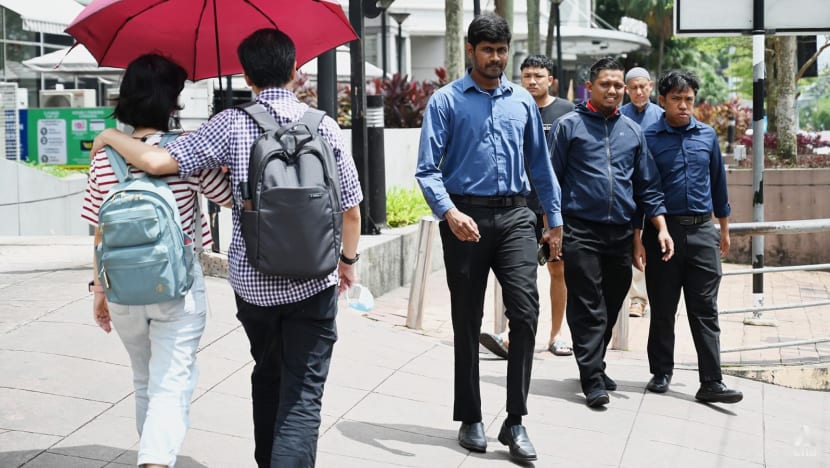
HIGHER TAX COLLECTIONS
Mr Anwar also said on Friday that the government will expand the scope of the SST to increase revenue but also to make it more progressive and ensure the lower-income are not burdened.
The scope of the service tax will be expanded to include commercial services, such as financial services that are based on fees, Mr Anwar said.
"The sales tax will not be imposed on basic food items used by the people. It will be imposed on non-essential food items like premium imports, including salmon and avocado," he added.
The government will meet with stakeholders like affected industries before finalising the expansion of the scope and rate of the SST.
"The progressive expansion of the SST's scope will be take effect on May 1, 2025. A part of the revenue gained will be used to enhance cash assistance for the people and improve the quality of education and healthcare," Mr Anwar said.
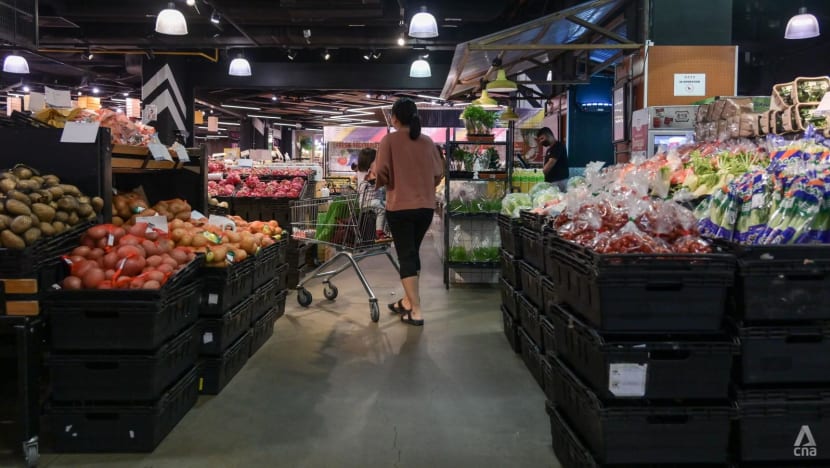
Separately, he announced that the 2 per cent dividend tax will be introduced in the year of assessment 2025 on dividend income exceeding RM100,000 received by an individual shareholder.
"This will be done so that our tax revenue will not only depend on contributions from income tax, but also contributions by company owners and individuals who own shares worth millions of ringgit," he added.
"We will consider exempting dividends derived from government savings such as the Employees Provident Fund, share trusts under Permodalan Nasional Bhd, and dividend income from abroad," he added.
Direct tax collection in 2025 is projected to increase by 6.6 per cent to RM188.8 billion in anticipation of better income tax collection from the phased implementation of e-invoicing and an improving economic outlook.
Company income tax remains the largest contributor to direct taxes, followed by individual income tax, which is estimated to go up by 7.8 per cent to RM44 billion, in line with the stable job market and improved wages, the Finance Ministry said.
Indirect tax is forecast to rise by 9.8 per cent to RM70.2 billion, with the SST collection making up the bulk of it. The rise is in tandem with the full implementation of the new service tax rate, as well as improving business confidence and consumer sentiment, the ministry said.
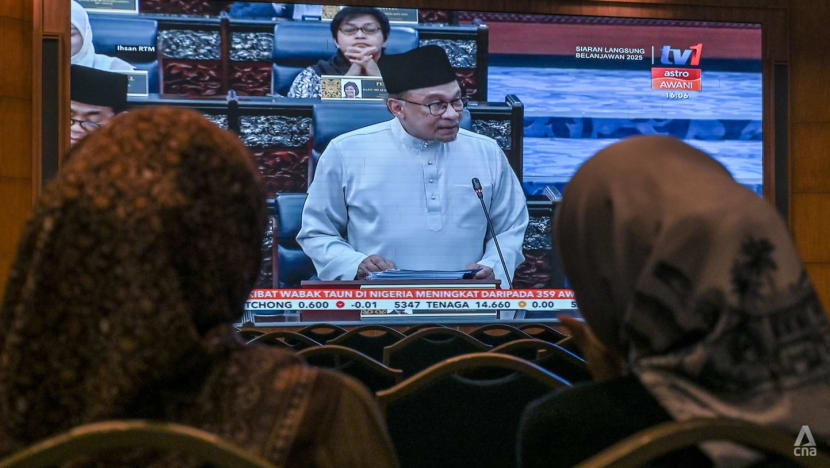
Meanwhile, non-tax revenue is projected to decrease slightly to RM80.7 billion due to lower proceeds from investment income. National oil company Petronas is expected to pay a dividend of RM32 billion in 2025, the same as 2024, amid concerns over lower global oil prices.
“The government will continue strengthening revenue management, while enhancing efficiency through the use of technological advancements and innovative approaches,” the ministry added.
Mr Anwar, who began his budget speech on Friday at about 4pm, wrapped it up in under three hours.
The budget statement will be debated at the policy level for eight days starting Oct 21, followed then by responses from the relevant ministries from Nov 6, according to the calendar posted on the Malaysian parliament portal.
"NOBLE ATTEMPT": ANALYSTS
Ms Lavanya Venkateswaran, a senior ASEAN economist at OCBC, said in a statement on Friday that the budget was a "noble attempt at balancing economic priorities with political realities".
While moves to broaden the tax base were steps in the right direction, bolder reforms like bringing back GST remained off the table, she noted.
"For the government to achieve its 2025 fiscal deficit target, follow through on RON95 rationalisation is crucial. More importantly, if targeted RON95 subsidy rationalisation does not yield the anticipated fiscal savings, the door should remain open to eliminating these subsidies altogether," she said.
"On the tax front, GST remains the elephant in the room, and is likely required at some point for fiscal consolidation to be achieved in a credible manner over the medium-term."
Economist Shankaran Nambiar said that in setting a new fiscal deficit target, it appears that the "thrust" of revenue generation for the government lies in the expansion of the SST.
"It is not clear how subsidy rationalisation will work for education and healthcare. The rich are not the main consumers of public education and healthcare, limiting the scope for subsidy savings through these mechanisms," he told CNA.
"The rationalisation of subsidies for RON95 will free up funds substantially. Nevertheless, the PM added the caveat that 85 per cent would not be affected. Again, the full force of the move will not be gained."
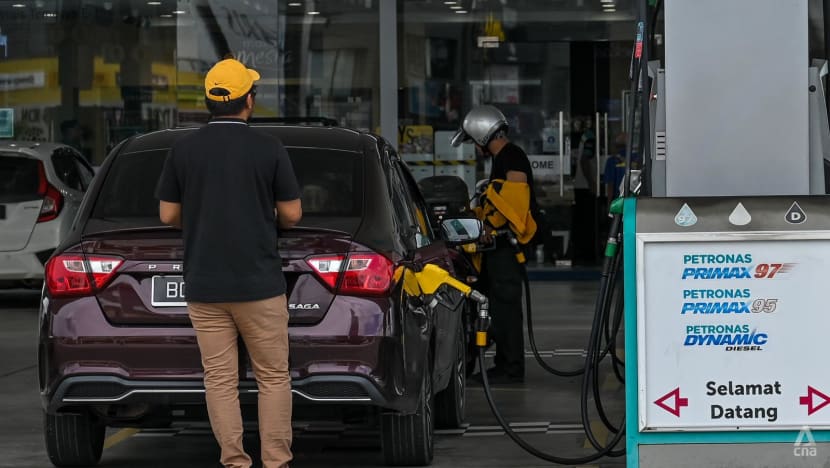
Mr Asrul Hadi Abdullah Sani, partner at strategic advisory firm ADA Southeast Asia, told CNA that the move to ease petrol subsidies is important to address the wealth gap in Malaysia.
But he added that it would not amount to much in subsidy savings in the long run, especially as it would be politically difficult for the government to remove the subsidy completely soon.
"We can expect the federal government to gradually expand the targeted group for those not qualifying for the petrol subsidy," he said.
While the unity government emerged victorious in recent by-elections in Johor and Kelantan, it knows that the move could trigger public backlash - and negative consequences at the ballot box - if not done gradually and carefully, Mr Asrul Hadi said.
"Despite UMNO's recent performance in the by-elections, the total removal of petrol subsidies could shift the momentum back to the opposition," he added, referring to the Barisan Nasional lynchpin party United Malays National Organisation, which is part of the unity government.
"Anwar does not want to repeat the same mistake as Najib when he introduced the GST, which eventually was one of the main reasons Barisan Nasional lost the 2018 general election."
Despite that, some segments have expressed concern with Mr Anwar's budget, particularly his move to raise the country's minimum wage and introduce a dividend tax.
Mr William Ng, president of the Small and Medium Enterprises (SME) Association of Malaysia, said in a statement on Friday that the moves will disrupt SME operations at a time when they are already not earning much.
"Automation is not an automatic answer for SMEs coping with severe margin compression, which will now be made worse by the minimum wage increment," he said, noting that many SMEs have workers in labour-intensive sectors like retail, cleaning, as well as food and beverage who are not readily replaced by automation.
Furthermore, Mr Ng said the dividend tax will hurt SME owners disproportionately, highlighting that these owners usually get dividends directly, unlike in listed companies where dividends go to "some silent or random investor".
"Many SME owners do not draw salaries, due to the tight cash flow experienced by most SMEs in recent years," he added.
"As such, taxing them on dividend from income that is already taxed is not only a form of double taxation, but will discourage SMEs from growing their business or turning in higher profits."




















